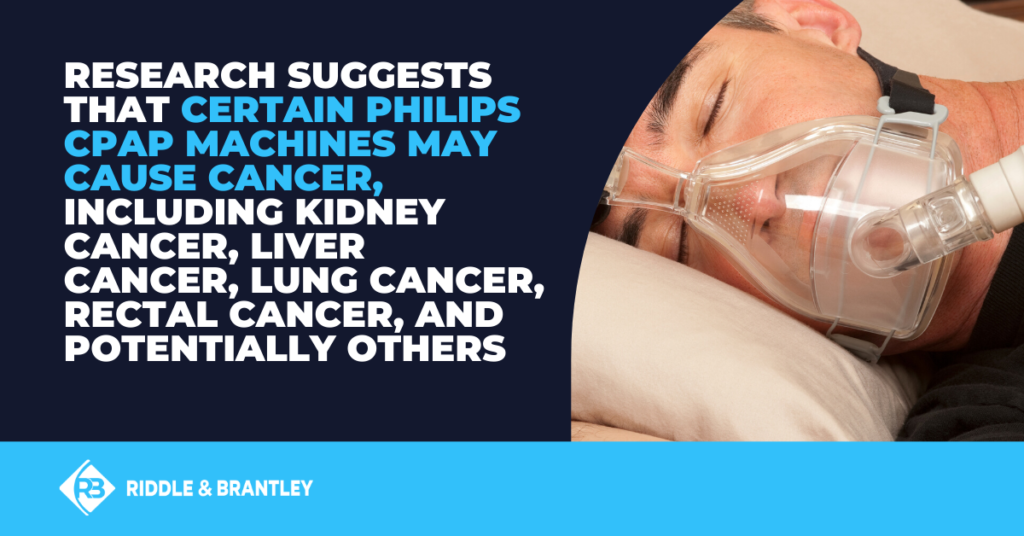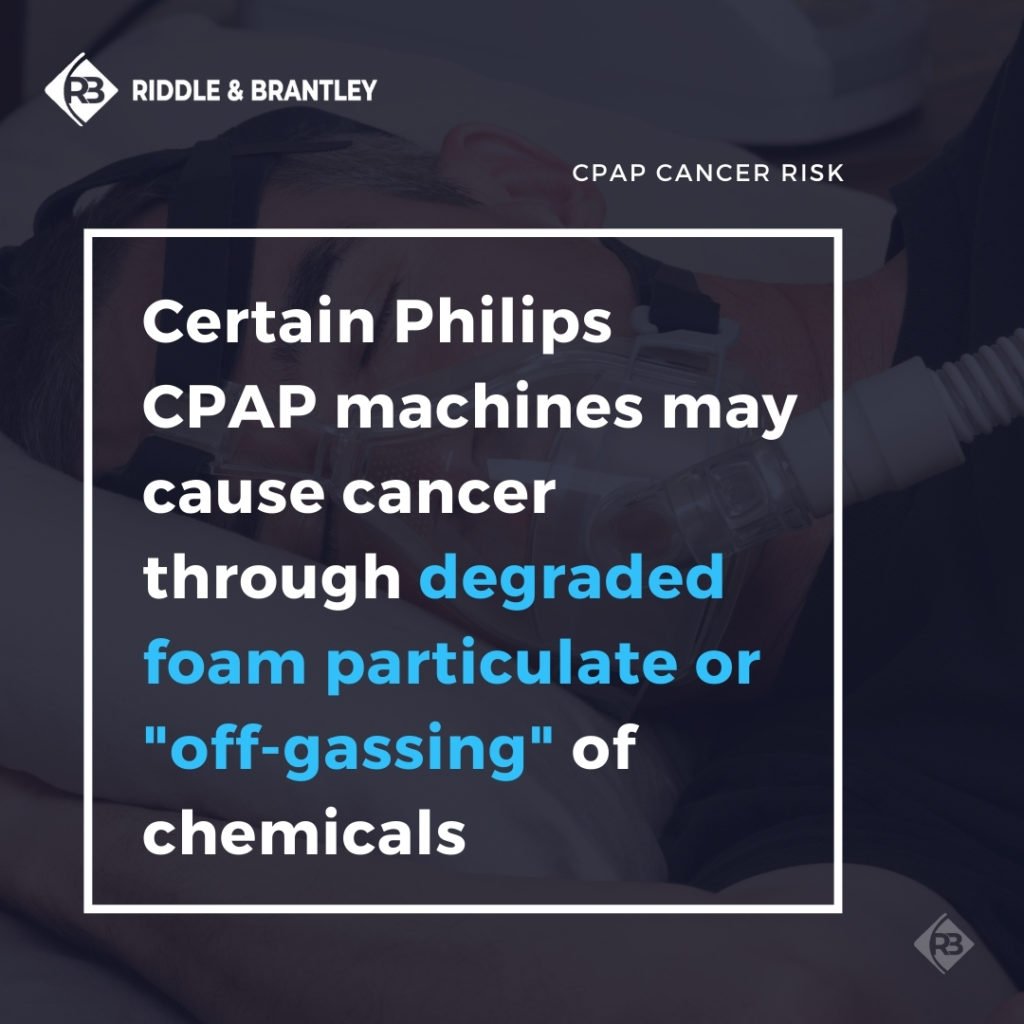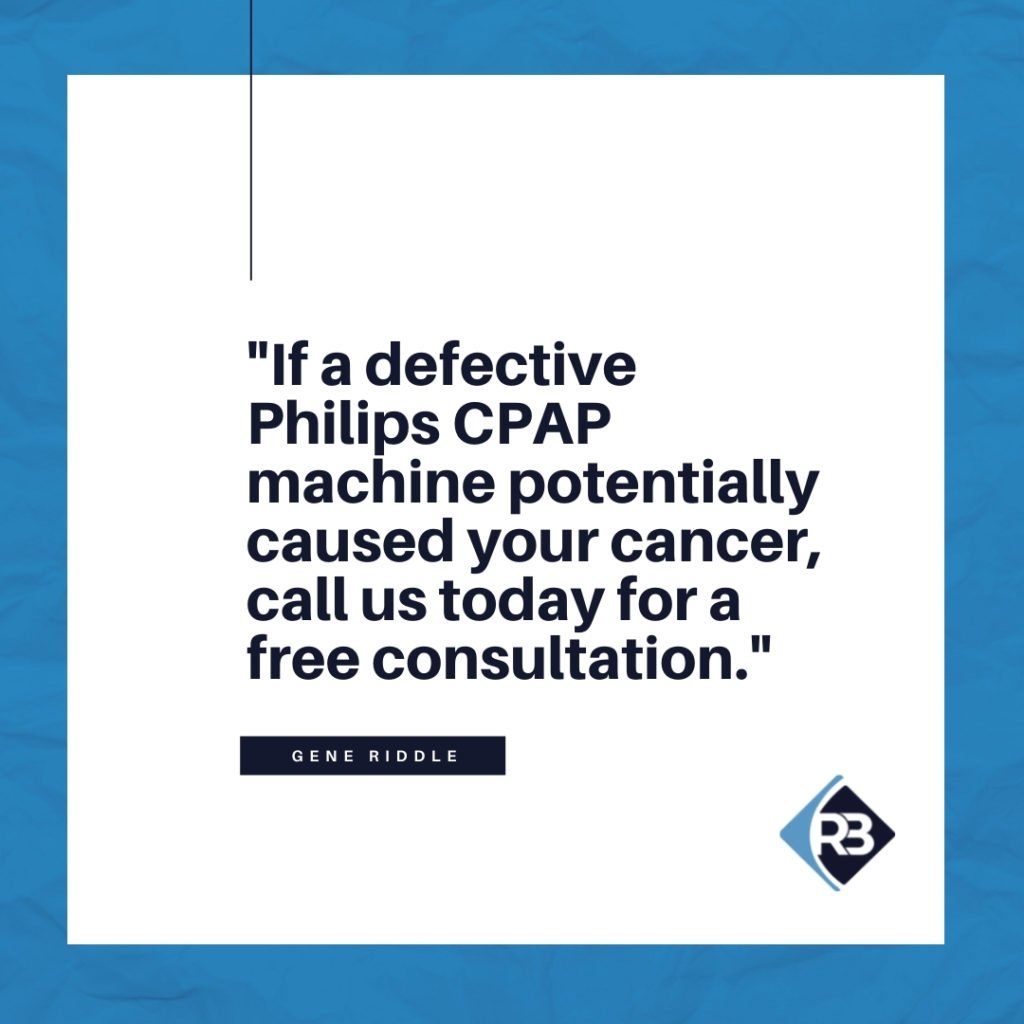What Kind of Cancer Can CPAP Machines Cause?
Types of Cancer Potentially Caused by CPAP Machines
 It has been alleged that certain defective Philips CPAP machines cause cancer due to a known product defect. Other potentially dangerous Philips medical devices include BiLevel PAP machines and mechanical ventilators. A major recall has been issued affecting millions of defective medical devices, and CPAP lawsuits are being filed across the United States.
It has been alleged that certain defective Philips CPAP machines cause cancer due to a known product defect. Other potentially dangerous Philips medical devices include BiLevel PAP machines and mechanical ventilators. A major recall has been issued affecting millions of defective medical devices, and CPAP lawsuits are being filed across the United States.
While originally, Philips and others warned that the inhalation or absorption of toxic sound-abating, polyurethane foam particulate may increase the risk of lung cancer, in recent months, speculation has grown that defective CPAP machines may cause other types of cancer, as well.
Cancers potentially caused by degrading foam and “off-gassing” in Philips CPAP machines include:
- Lung cancer
- Kidney cancer
- Liver cancer
- Rectal cancer
- Brain cancer
- Stomach cancer
- Testicular cancer
- Nasal cancer
- Throat cancer
- Laryngeal cancer
- Thryoid cancer
- Papillary cancer
- Various types of leukemia
- Non-Hodgkin’s lymphoma
- Multiple myeloma
Other injuries potentially caused by inhaling or absorbing foam particulates from Philips CPAP machines include:
- Severe ear, eye, nose, throat, sinus, or oral cavity inflammation and injury including nodules, cysts, and tumors
- Respiratory problems, including:
- Reactive Airway Disease (RAD)
- Acute Respiratory Distress Syndrome (ARDS)
- Recurrent pneumonia
- New or or worsening asthma
- Lung damage / lung disease
- Kidney damage/ kidney disease
- Liver damage / liver disease
- Heart problems
- Sudden respiratory failure leading to heart attack
IMPORTANT: Due to developments in the multi-district litigation, we can no longer accept kidney or liver cancer claims related to Philips CPAP machines. Other cancers and health problems may still qualify. Please call 1-888-652-6598 for a free case review.
IMPORTANT: If you or a loved one has used a recalled Philips CPAP machine, BiLevel PAP machine, or mechanical ventilator and suffered from a qualifying cancer or other health problem, you may be entitled to compensation in a CPAP lawsuit. Please call 1-800-525-7111 or complete the form below for a FREE, no-obligation consultation. There are absolutely no attorney fees unless we win your case and you receive compensation.
Cancer and CPAP Machines: What Does the Research Say?
 It is very early in investigations into the potential link between defective CPAP machines and types of cancer. However, to be clear, scientific research indicates there are many types of cancer that may be caused by CPAP machines affected by the defects mentioned in Philips’ recall.
It is very early in investigations into the potential link between defective CPAP machines and types of cancer. However, to be clear, scientific research indicates there are many types of cancer that may be caused by CPAP machines affected by the defects mentioned in Philips’ recall.
Cancers potentially linked to Philips CPAP machines may be caused by two primary processes:
- Inhalation or absorption of degraded polyurethane foam particulate
- Inhalation of absorption of “off-gassing” of chemicals from degraded polyurethane foam
Cancers Potentially Caused by Degraded CPAP Foam Particulate
In recalling millions of CPAP machines, BiLevel PAP machines, and mechanical ventilators, Philips said that it had “received reports of possible patient impact due to foam degradation.” The sound-abating foam in Philips breathing machines is made of polyurethane, comprised of potentially toxic chemicals which may be harmful when inhaled, absorbed, or swallowed.
Existing research does suggest that degraded foam particulate in defective Philips CPAP machines may enter the airways and lungs, be absorbed, and cause serious health issues, including but not limited to cancers like lung cancer, kidney cancer, liver cancer, and rectal cancer.
Cancers Potentially Caused by “Off-Gassing” of Polyurethane Decomposition in CPAP Machines
When polyurethane foam degrades, it emits or “off-gases” certain potentially toxic and harmful chemicals, many of which may increase the risk of cancer when inhaled. This effect presents yet more potential kinds of cancer that may be caused by CPAP machines with degraded foam.
Research has linked the following “off-gases” of polyurethane degradation to cancer:
- Benzene — Also recently discovered in certain possibly cancer-causing sunscreens, benzene is a dangerous and toxic chemical that has been linked to leukemia, breast cancer, and other lymphatic cancers.
- PFOS — PFOS, or perfluorooctane sulfanate, can be emitted by the degradation of polyurethane foam, and research suggests it can cause prostate cancer, breast cancer, bladder cancer, liver cancer, pancreatic cancer, testicular cancer, and kidney cancer, and possibly others.
- Formaldehyde — Formaldehyde has long been known to be toxic, and its inhalation has been linked to nasal cancer.
- Methylene chlorine — This dangerous “off-gas” of foam degradation (which can occur in certain Philips CPAP and other breathing machines) has been linked to lung cancer, liver cancer, non-Hodgkins lymphoma (NHL), multiple myeloma, and brain cancer.
- Solvents — Various solvents emitted as gas from degrading polyurethane foam can potentially cause cancer, including lung cancer, bladder cancer, stomach cancer, and potentially others.
- Volatile Organic Compounds (VOCs) — These dangerous chemicals when inhaled or absorbed may cause nasal cancer.
Was Your Type of Cancer Caused by a CPAP Machine, BiLevel PAP Machine, or Mechanical Ventilator?
Our defective medical device lawyers are actively investigating claims that Philips CPAP machines cause cancer. If you’ve been diagnosed with cancer after using a Philips CPAP machine or other breathing device, you may be entitled to compensation and we would love to help you get the justice you deserve. Call 1-800-525-7111 for a FREE consultation today.
IMPORTANT: Due to developments in the multi-district litigation, we can no longer accept kidney or liver cancer claims related to Philips CPAP machines. Other cancers and health problems may still qualify. Please call 1-888-652-6598 for a free case review.
Potential plaintiffs must meet the following criteria to qualify for a Philips CPAP lawsuit:
- Used a qualifying recalled Philips BiLevel CPAP, Philips CPAP machine, or Philips ventilator
- Diagnosed with a qualifying cancer or health problem
- Meet criteria re: previous smoking history if affected by lung cancer
Don’t wait — our firm is actively investigating these claims and we are ready to help. Call 1-800-525-7111 or complete the convenient form below for a FREE, no-obligation consultation with an experienced CPAP lawsuit attorney.
Why Riddle & Brantley?
 Our injury attorneys have been helping victims of others’ negligence seek compensation for their suffering since 1985. Since 2000 alone, we’ve recovered more than $600 million in total compensation for our deserving clients (see disclaimer below), and our attorneys have been recognized by such prestigious organizations and awards as Multi-Million Dollar Advocates Forum, The National Trial Lawyers Top 100, Super Lawyers, AV Preeminent by Martindale-Hubbell, The Litigator Award, and more (see disclaimer below).
Our injury attorneys have been helping victims of others’ negligence seek compensation for their suffering since 1985. Since 2000 alone, we’ve recovered more than $600 million in total compensation for our deserving clients (see disclaimer below), and our attorneys have been recognized by such prestigious organizations and awards as Multi-Million Dollar Advocates Forum, The National Trial Lawyers Top 100, Super Lawyers, AV Preeminent by Martindale-Hubbell, The Litigator Award, and more (see disclaimer below).
“This settlement changed me and my family’s lives.”
–Linda B., Riddle & Brantley client
Call for a FREE, no-obligation consultation today. We are proud of the way our clients speak about their experience with us, and we are ready to show you the Riddle & Brantley difference.
Please call 1-800-525-7111 to see if your kind of cancer may have been caused by a CPAP machine and determine if you may qualify for a Philips CPAP lawsuit.
Justice Counts.
*** Disclaimer: The results mentioned are intended to illustrate the type of cases handled by the firm. These results do not guarantee a similar outcome, and they should not be construed to constitute a promise or guarantee of a particular result in any particular case. Every case is different, and the outcome of any case depends upon a variety of factors unique to that case.
*** Disclaimer: An attorney must meet certain requirements to join these organizations or receive these awards. For more information on Membership Criteria for Million Dollar Advocates Forum, Multi-Million Dollar Advocates Forum, Super Lawyers, The National Trial Lawyers Top 100, The National Trial Lawyers Top 40 Under 40, The National Association of Distinguished Counsel, AV Preeminent by Martindale-Hubbell, the Litigator Award, and other memberships, awards, and accolades, please visit our Membership Criteria page. These awards and memberships should not be construed as a promise or guarantee of a similar result. Each case is different and must be evaluated separately.